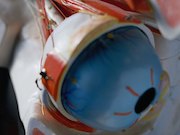Glaucoma drainage device linked to worse HRQOL compared with trabeculectomy, medical treatment
MONDAY, Feb. 26, 2018 (HealthDay News) — Reduced health-related quality of life (HRQOL) in surgically and medically treated patients with glaucoma is associated with factors including worse diplopia, poorer visual acuity in either eye, and treatment type, according to a study published online Feb. 22 in JAMA Ophthalmology.
Cheryl L. Khanna, M.D., from the Mayo Clinic in Rochester, Minn., and colleagues conducted a prospective cohort study involving 160 consecutive, prospectively enrolled medically or surgically treated adult patients with glaucoma; 36 had undergone glaucoma drainage device surgery, 51 underwent trabeculectomy, and 73 were medically treated. Patients completed two HRQOL questionnaires.
The researchers found that there was a correlation for reduced HRQOL with worse diplopia on six subscales. There were correlations for reduced HRQOL with lower best-eye mean deviation (five of six subscales); lower worst-eye mean deviation (four of six subscales); treatment group (three of six subscales); lower worst-eye visual acuity (five of six subscales); lower best-eye visual acuity (two of six subscales); and younger age (two of six subscales). Glaucoma drainage device was correlated with worse HRQOL in three and two Adult Strabismus-20 questionnaire subscales compared with trabeculectomy and medical treatment, respectively.
“Overall, poor HRQOL in patients with glaucoma is moderately associated with worse diplopia, lower mean deviation on visual field testing in either eye, poorer visual acuity in either eye, treatment type, and younger age,” the authors write. “Psychosocial effects of glaucoma drainage device should be considered when counseling patients with glaucoma.”
Copyright © 2018 HealthDay. All rights reserved.








